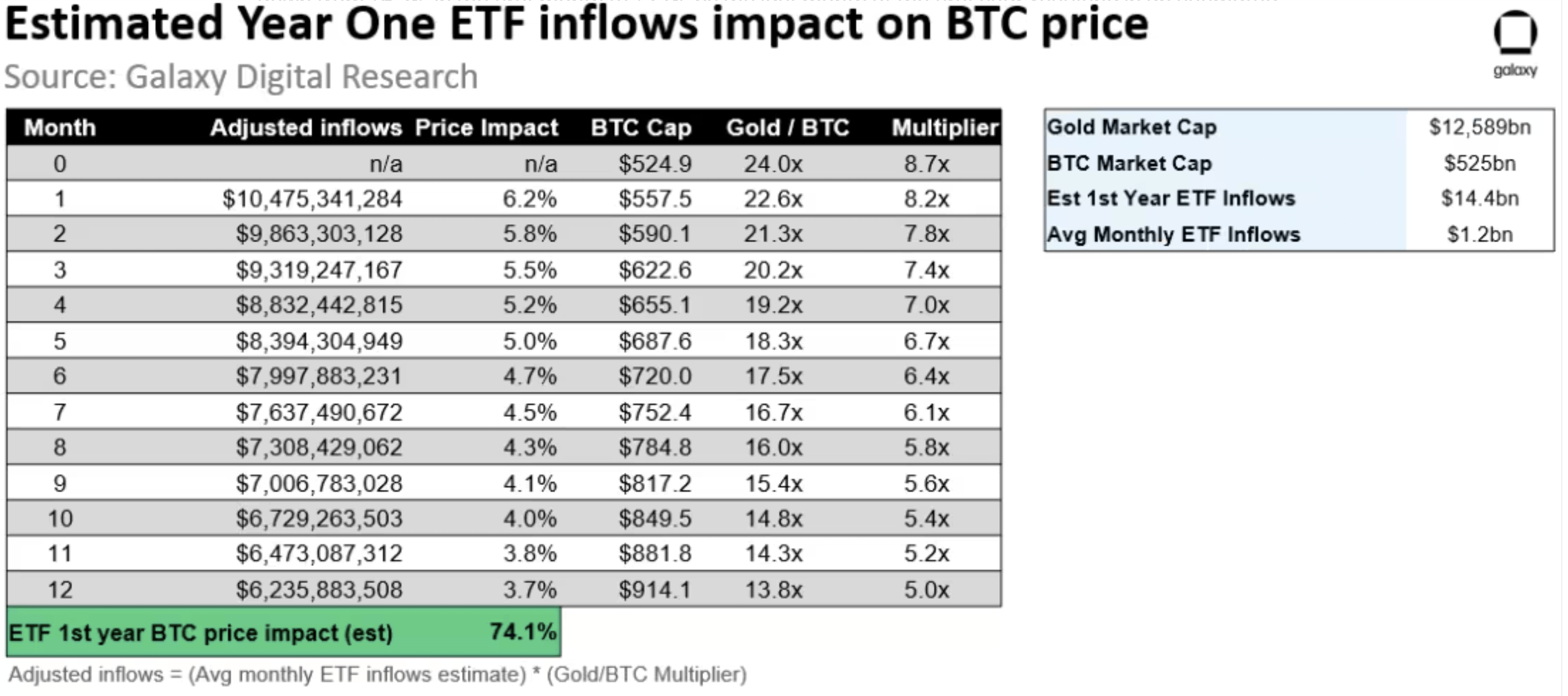[ad_1]
Galaxy Digital, a number one participant within the digital property sphere, has issued a bullish prediction for Bitcoin’s trajectory following the launch of the much-anticipated US-regulated spot Bitcoin ETF. In response to a latest research printed by the agency on October 24, the introduction of the ETF is about to significantly bolster Bitcoin’s adoption, positioning it extra firmly as a acknowledged asset class.
Benefits Of An ETF
Galaxy’s analysis highlights {that a} spot Bitcoin ETF could be “probably the most impactful catalysts for the adoption of Bitcoin (and crypto as an asset class).” By the tip of September, Bitcoin property held throughout numerous funding merchandise like ETPs and closed-end funds touched a powerful determine of 842,000 BTC, valuing roughly $21.7 billion.
Galaxy Digital’s research additionally sheds mild on the challenges confronted by these funding avenues, pointing to elements like excessive charges, monitoring errors, restricted liquidity, and a considerably constrained attain amongst broader investor teams. The introduction of the spot Bitcoin ETF, the report suggests, is poised to alter this situation dramatically.
Spot Bitcoin ETFs provide a mess of advantages over the present constructions: an improved payment system, higher liquidity, higher value monitoring, and a much-needed break from the problems of self-custodying property. Because the report explicitly states, “The presence of a US-regulated spot Bitcoin ETF that adheres to strict regulatory compliance not solely supplies a safer platform but in addition elevates its transparency, making it a preferable alternative over present funding merchandise.”
Why A Spot Bitcoin ETF Issues
Galaxy believes that the introduction of a Bitcoin ETF would enhance the digital asset’s “accessibility throughout wealth segments” and set up “higher acceptance by way of formal recognition by regulators and trusted monetary providers manufacturers.”
The report highlights the disparity between age teams on the subject of Bitcoin investments. It reveals that whereas Boomers and older generations maintain 62% of US wealth, solely 8% of adults aged 50 and above have invested in cryptocurrency.
Galaxy sees regulatory approval for a Bitcoin ETF as a big step in the direction of establishing Bitcoin as a mainstream funding. An ETF might assist cut back market volatility by providing “higher value transparency and discovery for market individuals.”
Estimating Inflows From ETF Approval
Galaxy’s forecast suggests the US wealth administration sector, managing a mixed asset price $48.3 trillion, would be the most impacted by a Bitcoin ETF’s launch. They estimate potential inflows into the Bitcoin ETF to be round $14 billion within the first yr, escalating to $27 billion within the second yr and reaching $39 billion by the third yr.
Factoring within the historic relationship between gold ETF fund flows and gold value change, Galaxy predicts a possible value enhance of 6.2% for BTC within the first month after an ETF’s launch. They undertaking this to taper right down to +3.7% by the final month of the primary yr, leading to an estimated +74% enhance in BTC within the first yr of an ETF approval. On the present value, this is able to imply that BTC might rise above $59,000 within the post-ETF debut yr.

The Larger Image
Past the potential inflows right into a US ETF product, Galaxy predicts that there can be a a lot bigger affect on BTC demand “from second-order results”. The potential approval of a spot ETF within the US would possibly instigate comparable merchandise in different international markets. Furthermore, Galaxy expects that varied different funding autos, like mutual funds and personal funds, will combine Bitcoin into their methods.
Galaxy suggests the potential for Bitcoin’s Complete Addressable Market (TAM) to develop considerably, maybe encroaching on conventional asset sectors like actual property and treasured metals. The estimated potential new inflows into BTC might vary between $125 billion to $450 billion “over an prolonged interval.”

Featured picture from Shutterstock, chart from TradingView.com
[ad_2]
Source link



